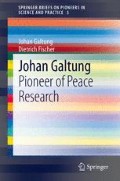Abstract
Peace studies seeks to understand the negation of violence through conflict transformation, cooperation and harmony by drawing from many disciplines, including psychology, sociology and anthropology, political science, economics, international relations, international law and history. This raises the problem of the complementarity, coexistence and integration of different systems of knowledge. In fact, all of the human and social sciences are products of the post-Westphalian state system and so reify the state and its internal and international system and focus on this as the main source of political conflict. Conflicts, however, can arise from other distinctions involving gender, generation, race, class and so on. To contribute to peace building and conflict resolution, the social sciences must be globalized, developing theories that address conflicts at the levels of interpersonal interaction (micro), within countries (meso), between nations (macro), and between whole regions or civilizations (mega). Psychiatry and the “psy” disciplines can contribute to peace building and conflict resolution through understanding the interactions between processes at each of these levels and the mental health or illness of individuals.
This article is based on two talks given at the McGill Advanced Study Institute in Cultural Psychiatry, on Peace, Conflict and Reconciliation, Montreal, April 29 and May 1, 2008. It was first published in: Transcultural Psychiatry, March 2010 and republished here with the permission of the copyright holder.
Access this chapter
Tax calculation will be finalised at checkout
Purchases are for personal use only
References
Galtung J (2004): Transcend and Transform: An Introduction to Conflict Work. (Boulder: Paradigm).
Galtung J (2008): 50 Years: 100 Peace and Conflict Perspectives. (Transcend University Press).
World Health Organization (WHO), (2008): The Global Burden of Disease: 2004 Update. (Geneva: WHO).
World Health Organization Survey Consortium, (2004): The Prevalence, Severity, and Unmet Need for Treatment of Mental Disorders in the World Health. (Geneva: WHO).
Author information
Authors and Affiliations
Corresponding author
Rights and permissions
Copyright information
© 2013 The Author(s)
About this chapter
Cite this chapter
Galtung, J., Fischer, D. (2013). Peace Studies and Conflict Resolution: The Need for Transdisciplinarity. In: Johan Galtung. SpringerBriefs on Pioneers in Science and Practice, vol 5. Springer, Berlin, Heidelberg. https://doi.org/10.1007/978-3-642-32481-9_13
Download citation
DOI: https://doi.org/10.1007/978-3-642-32481-9_13
Published:
Publisher Name: Springer, Berlin, Heidelberg
Print ISBN: 978-3-642-32480-2
Online ISBN: 978-3-642-32481-9
eBook Packages: Earth and Environmental ScienceEarth and Environmental Science (R0)

